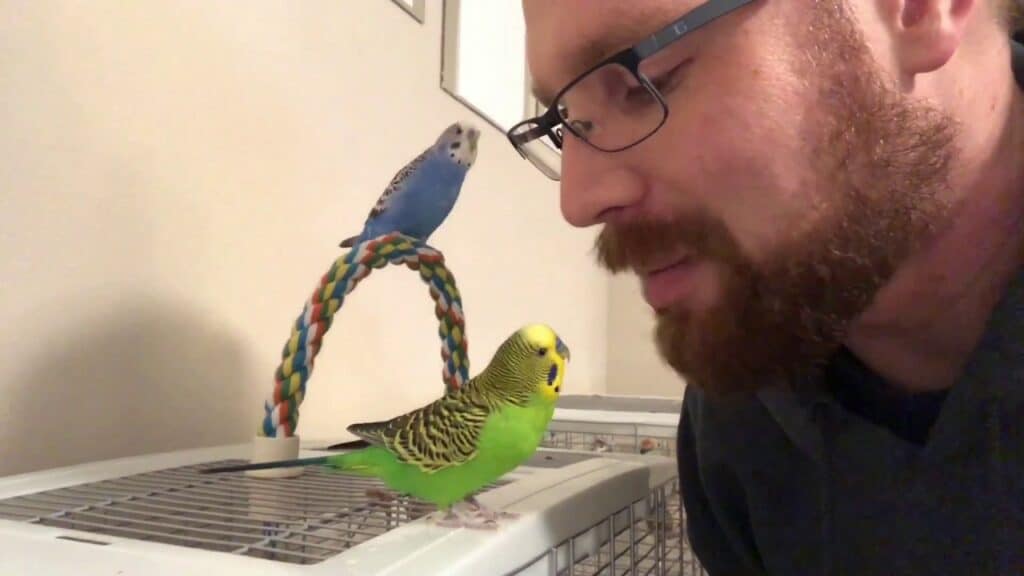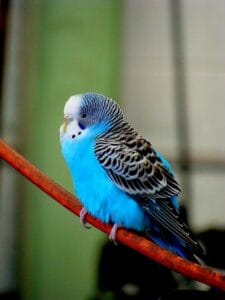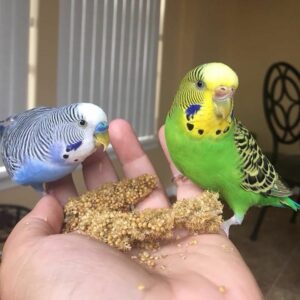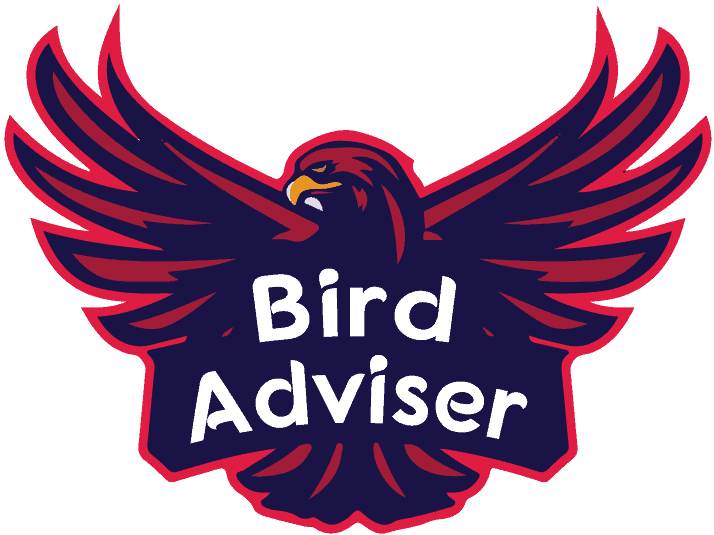Have you ever been captivated by the idea of having a chatty companion right in your home?
If so, you’re in for a treat.
Training a parakeet to talk is an exciting journey that opens up a world of communication between you and your feathered friend.
In this article, I’ll guide you through the steps to successfully teach your parakeet to mimic words and phrases.
So, if you’re ready to embark on a fun and rewarding adventure, let’s dive into the wonderful world of teaching parakeets to talk!

How to Train a Parakeet to Talk?
Training a parakeet to talk might seem simple, but its time is taking and a bit tiring work.
You have to be regular with the practice, and you have to take care of the following things in training a parakeet to talk.
1. Keep Limited Parakeets

Parakeets are noisy, and they develop the habit of talking to others, even if it’s a human.
Parakeets tend to talk to other birds and create a lot of noise, so you need to have a single parakeet to which you can train to talk well and pronounce words.
Having a single parakeet will make it simpler and easier for you to develop a bond and teach him the words or phrases you want.
Try to keep the focus of the word on you when you are trying to teach him new words by getting his attention.
2. Give a Comfortable Environment to Parakeets
As a parakeet owner, it’s your duty to stay friendly and talkative with your budgie; try to provide him with an environment where there are fewer birds or other pets around him.
This will make him more comfortable and friendly with you.
After building trust with your parakeet, you can interact with him on a daily basis and teach him kind new words by repeating phrases in front of him.
If your parakeet is scared of the environment or if there are certain noises around in your room, then it may be hard for your parakeet to understand and listen to you.
3. Choose Proper Time for Communication
You should start to teach and train your parakeet after when he is calm and has all the attention on you.
In this way, he will listen and respond better.
If he is tired or distracted, he may not be able to understand your signs and words.
You should be starting the training of your parakeet in the morning because it is a fresh start to the day, and your parakeet will be more active at that time.
Try to give him rest after the evening time as your pet may get tired after the whole day’s chirps.
4. Repeat Words Again and Again
When you want to train your parakeet to speak, you should know that it won’t pick you up the first time.
You have to repeat the words or phrases many times during the day in front of your parakeet so that he can catch the tune and your word and be able to mimic it.
5. Reward Him With Treats

When your parakeet starts to learn new words that you are trying to teach him, give him treats or food for whatever he is speaking.
This will make him feel good, and he will start to be more comfortable with you.
Your bond with your parakeet will grow when you feed him with millet and seeds after he speaks a few words and phrases.
You can use carrots and celery, and other such items as a reward for your little pet.
6. Teach One Word at a Time
You can teach a whole sentence to your parakeet.
They don’t tend to catch what you are saying.
The only thing you can do, try teaching him one word at a time.
Use a single word or phrase for many days until your budgie gets a grasp on it.
Any phrase that contains lots of vowels will be difficult for the parakeet to speak, so you should try using easy words and phrases that should be able to adapt and be understood by your parakeet.
You need to keep your voice and tone clear, so your budgie understands it well.
7. Respond to Parakeet’s Actions
You need to keep your relationship strong and communication active with your parakeet as you keep trying to respond to whatever he does and whatever he says.
Be a very good friend to your parakeet and keep the interaction going on.
Some behaviors are easier to interpret, so you will be able to understand what your bird wants to do.
With time you will be able to know when he is hungry he is louder or chirping all the time, or he may walk a lot when he wants to go to the bathroom.
Stuff like that will be common and more understandable by both of you.
You will even know when your parakeet wants to sleep.
Stay connected with your parakeet and keep him busy with your slow talks and let him chatter all day.
With time you will understand each other better, and your budgie will be trained well enough to catch the words that you often repeat.
Then after some time, he will start to speak those words.
Tips To Train a Parakeet to Talk
- Buy a young parakeet.
- Make sure you only have one pet bird because if you have two, they will most likely bond with one another, and it will be harder for you to teach your parakeet to talk.
- Start to build a bond with your parakeet and stay around him more often so that he can trust you and starts to sit on your hand.
- Repeat the word or phrase you want to teach to your parakeet consistently.
- Try to link those words with some kind of tasks and activities to be performed by your bird. Use certain phrases at the time when they act for something like coming into the cage or asking for food. Use common phrases and make them a daily habit, so you’re your parakeet gets aware of your words or phrases and assume a meaning out of them.
- You must make sure not to be offensive or abusive in front of your learning parakeet as it would start to use those words and phrases in front of your guests and friends too.
Parakeets Can Talk
Parakeets do have similarities with humans in speaking few words.
They can learn to speak certain words that humans speak in their daily life.
It is for sure that they don’t pronounce a word the same as humans do, but you surely get the idea of what they are trying to say.
This difference is because parakeets don’t have vocal cords as a human being does.
Parakeets make the sound using their airways and beak.
They mimic whatever the owner says and try to say it by themselves.
In doing so, they make different weird sounds too.
You may also hear them using weird sounds or taught words even with their partners in the cage.
These little fellows are very intelligent and active, due to which they can easily understand what a person is saying, and they mimic it easily.
They don’t actually know what is the meaning behind that word as they are birds, so they don’t have the vocabulary.
They can also produce sounds that humans want them to pronounce.
Conclusion
In conclusion, the process of training a parakeet to talk is a remarkable journey that fosters a unique bond of communication between you and your feathered companion.
Patience, consistency, and a genuine connection are key to success in this endeavor.
As you’ve learned, parakeets have an incredible capacity to mimic sounds and words, adding an element of delight and surprise to your daily interactions.
Remember, not all parakeets will become chatterboxes, and that’s perfectly fine.
Each bird has its own personality and capabilities.
The joy lies not only in hearing your parakeet utter words but in the moments you spend together, nurturing trust and companionship.
As you embark on this fascinating journey, celebrate every small achievement and cherish the progress you make together.
Whether your parakeet greets you with a cheerful “hello” or simply chirps in response to your efforts, the journey of training is a rewarding experience that enriches both your lives.
So, with determination and a sense of adventure, may your parakeet’s newfound words become a testament to the wonderful connection you’ve cultivated.
FAQ
Can all parakeets learn to talk?
While parakeets have the ability to mimic sounds, not all will develop the skill to talk. Some parakeets are more inclined to mimic than others. Patience and consistency are key to encouraging your parakeet’s talking potential.
At what age should I start training my parakeet to talk?
It’s best to start training when your parakeet is young, ideally around 3 to 4 months old. Younger birds tend to be more receptive to new sounds and experiences.
What's the first step in training a parakeet to talk?
Begin by establishing a strong bond with your parakeet through regular interactions and positive reinforcement. Spend time near their cage, talking softly and using their name, so they get used to your voice.
How do I introduce words to my parakeet?
Start with simple, repetitive words or phrases. Use clear pronunciation and speak in a cheerful, encouraging tone. Gradually incorporate these words into your conversations with your parakeet.
How long does it take for a parakeet to start talking?
The time it takes for a parakeet to start talking varies. Some may start mimicking within a few weeks, while others might take several months. Be patient and continue your efforts.
Last Updated on August 14, 2023 by Lily Aldrin
